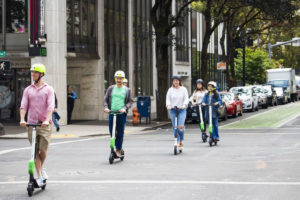By Michal Naka, Next City, April 6, 2020
Republished with permission
IN A MATTER OF DAYS, our lives have dramatically changed. Schools, bars and restaurants have closed. Events and gatherings are canceled. As cities across the world grapple with the coronavirus pandemic, people are limiting their travel and public transit ridership has decreased dramatically.
However, our communities still rely on essential employees like health-care and grocery-store workers — and they still need to get to work safely. In this moment, micromobility options like e-scooters and bikeshare are a lifeline for people with few other travel options, and over the long term, they can be a crucial element of cities’ resilience and preparedness for public health crises and natural disasters. Encouraging deployment of these versatile vehicles will allow our transportation system to more easily adapt, evolve, and support those most in need.
A shift in how we get around
As communities adapt to their new realities, we are noticing rapid changes in how people are choosing to make essential trips.
In early March, bikeshare ridership saw an initial surge in cities like New York City, Philadelphia, and others as wary riders avoid mass transit. We can expect ridership to fluctuate as governments issue stricter guidance to keep people safe at home as much as possible.
Cities are likely to see another wave of changes as they recover from the pandemic. In China, where restrictions on daily life have been lifted, bikeshare in Beijing saw rides increase 187 percent. This bounce in ridership shows us how micromobility can be a critical resource for communities recovering from the pandemic. Though riders may continue to be reluctant to use public transportation, e-scooters and bikes can help individuals ease back into public life.
The role of micromobility in pandemic response
Even at a time when continuing operations has become increasingly difficult for micromobility companies, we are seeing some using creative solutions to provide essential support for their customers.

In San Jose and Oakland, Gruv is providing free e-scooter rides to those on the front lines of pandemic response, including health-care and grocery-store workers. Lyft is providing free bikeshare access for people who work in health care, public transportation, or as first responders in Boston, Chicago, and New York City while Spin is doing the same with e-scooters in Baltimore, Los Angeles, Portland, and other cities. Hardware maker Brooklyness is loaning free scooters directly to health care providers in New York City. Nonprofit bikeshare systems in Kansas City and Detroit are going a step further, offering free bike and scooter rides to everyone. Wheels has paused its shared bike service in several cities, but is now making its pedal-less e-bikes with self-cleaning handlebars available to essential workers.
Wherever they are operating, mobility companies are stepping up efforts to clean and sanitize vehicles and keep workers safe. Spin has started attaching hand sanitizer to each scooter in San Francisco and other companies are sanitizing their vehicles more regularly and providing their field service staff with protective gloves.
City governments are also thinking outside of the box to keep essential services, goods and workers moving. With an influx of pickups and deliveries due to restaurant closures, cities like Toronto and Seattle are relaxing freight rules and providing dedicated curb space for delivery drivers. New York City has closed several streets to car traffic to encourage walking and biking while social distancing, and advocates in Denver, Boston and Philadelphia are pushing their city leaders to do the same. New Orleans, San Francisco and Philadelphia have all deemed bike shops as essential businesses so they can remain open and make repairs while most workplaces are on lockdown. On the federal level, a recent Cybersecurity and Infrastructure Security Agency memorandum indicated that bicycle maintenance should be considered essential.
In making these changes, cities across the globe are demonstrating how micromobility can play a critical role in helping cities build resilience in times of crisis. The challenge we face today is COVID-19, but in the future, it may be an earthquake, flooding, or severe weather brought on by climate change. In all of these scenarios, flexible and human-scale transportation options are necessary to preserve mobility and access to needed services and goods when cars or mass transit systems are inaccessible.
 Michal Naka is Head of Partner Products at Ride Report, which works with city governments to provide them with the data they need to monitor and regulate new mobility services.
Michal Naka is Head of Partner Products at Ride Report, which works with city governments to provide them with the data they need to monitor and regulate new mobility services.
